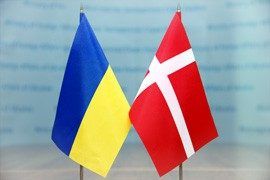News
International News in Brief: Danish millions going to bolster Ukraine and Georgia
This article is more than 8 years old.
Elsewhere, Danish aid makes difference in Nepal and Vestas gains key link in Russia

The Danish people continue to support Ukraine with donations (photo: Ministry of Foreign Affairs of Ukraine)
The foreign minister, Anders Samuelsen, has approved a new five-year aid program in Ukraine and Georgia worth 860 million kroner.
The so called ‘neighbourhood program’ focuses on core areas within the country’s reform efforts, particularly within democracy, human rights, and sustainable and inclusive economic growth. Moving out of the shadow of Russia is difficult for the former Soviet republics, contends Samuelsen.
“It’s in Denmark and Europe’s interest that Ukraine and Georgia continue on the European path they have chosen for themselves. Fundamentally, this is about stability and security in Europe,” said Samuelsen.
“The countries’ considerable reforms are a prerequisite to the development of a modern and well-functioning society. They are the best reply to Russian aggression and to complement the desire to become closer to Europe.”
READ MORE: Ukraine could become lucrative export market for Denmark
Nepalese success
In other news, Danish aid and development efforts in Nepal over the last 25 years have been assessed to offer many positives, according to a new evaluation from the Finnish consultancy group FCG International.
The evaluation, which can be downloaded here (in English) found that: “… the Danish engagement contributed to peacebuilding and decentralization in Nepal as well as to the development of the education system as a whole. Other key contributions related to renewable natural resources, the urban/industrial environment and dairy development.”
Since the Nepalese peace accord in 2006, Denmark has support the country with about 150 million kroner per year. The aid to Nepal is scheduled to be phased out by next year.
READ MORE: Vestas part of groundbreaking Australian hybrid plant
Vestas goes East
Elsewhere, the Danish wind turbine producer Vestas has picked up an important order in Russia – the world’s fourth largest electricity market.
The deal includes Vestas supplying 14 V126-3.6 MW turbines for a 50 MW project at an undisclosed site, and in co-operation with OOO Fortum Energy, the Danish company will help set up a blade factory in the Ulyanovsk Region, an assembly plant in the Nizhny Novgorod Region, and a towers factory in the Rostov Region.
“As the global leader in wind energy, it is an expression of our commitment to Russia that Vestas, together with Fortum Energy, takes a strong role in helping the world’s fourth largest electricity market towards a more sustainable energy mix,” said Nils de Baar, the president of Vestas Central Europe.
“Vestas will deliver its most advanced technology through our 4 MW platform as well as market-leading cost of energy and local manufacturing and supply-chain expertise that will provide affordable, sustainable energy and create long-term jobs across different Russian regions.”










































